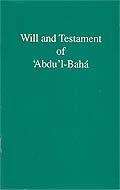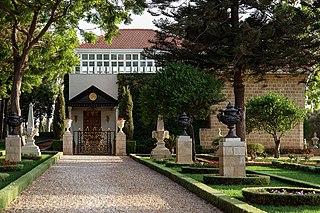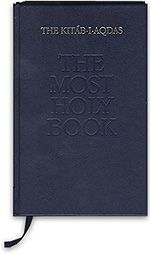| Texts and scriptures of the Bahá'í Faith |
|---|
  |
| From the Báb |
| From Bahá'u'lláh |
| From `Abdu'l-Bahá |
| From Shoghi Effendi |
A seminal document, written in three stages by `Abdu'l-Bahá. Several sections were written under imminent threat of harm. The first section was probably written in 1906.

`Abdu’l-Bahá', born `Abbás, was the eldest son of Bahá'u'lláh and served as head of the Bahá'í Faith from 1892 until 1921. `Abdu’l-Bahá was later canonized as the last of three "central figures" of the religion, along with Bahá'u'lláh and the Báb, and his writings and authenticated talks are regarded as a source of Bahá'í sacred literature.
Contents
- Overview of the Will and Testament
- Key provisions of the Will
- Bahá'í Fundamentals
- The Covenant
- The Guardianship and the Universal House of Justice
- Hands of the Cause of God
- Challenges to the Will
- References
- Further reading
- External links
This document constitutes one of the central and defining pieces of Bahá'í primary source literature, and is considered to be intimately connected to Bahá'u'lláh's ('Abdu'l-Bahá's father) Most Holy Book .

The Bahá'í Faith is a religion teaching the essential worth of all religions, and the unity and equality of all people. Established by Bahá'u'lláh in 1863, it initially grew in Persia and parts of the Middle East, where it has faced ongoing persecution since its inception. It is estimated to have between 5 and 8 million adherents, known as Bahá'ís, spread out into most of the world's countries and territories.

Bahá'u'lláh, was a Persian religious leader, prophet and the founder of the Bahá'í Faith, which advocates universal peace and unity among all races, nations, and religions.

The Kitáb-i-Aqdas or Aqdas is the central book of the Bahá'í Faith written by Bahá'u'lláh, the founder of the religion, in 1873. The work was written in Arabic under the Arabic title al-Kitābu l-Aqdas, but it is commonly referred to by its Persian title, Kitáb-i-Aqdas, which was given to the work by Bahá'u'lláh himself. It is sometimes also referred to as "the Most Holy Book", "the Book of Laws" or the Book of Aqdas. The word Aqdas has a significance in many languages as the superlative form of a word with its primary letters Q-D-Š.
The Will and Testament, along with the Tablets of the Divine Plan and the Tablet of Carmel , were described by Shoghi Effendi as the charters of the Bahá'í administration.

The Tablets of the Divine Plan collectively refers to 14 letters (tablets) written between March 1916 and March 1917 by `Abdu'l-Bahá to Bahá'ís in the United States and Canada. Included in multiple books, the first five tablets were printed in America in Star of the West - Vol. VII, No. 10, September 8, 1916, and all the tablets again after World War I in Vol. IX, No. 14, November 23, 1918, before being presented again at the Ridván meeting of 1919.

Shoghí Effendí Rabbání, better known as Shoghi Effendi, was the Guardian and appointed head of the Bahá'í Faith from 1921 until his death in 1957. Shoghi Effendi spent his early life in ʿAkkā (Acre). His education was directed to serving as secretary and translator to his grandfather, `Abdu'l-Bahá, then leader of the Bahá'í Faith and son of the religion's founder, Bahá'u'lláh.
The Bahá'í administration or Bahá'í administrative order is the administrative system of the Bahá'í Faith. It is split into two parts, the elected and the appointed. The supreme governing institution of the Bahá'í Faith is the Universal House of Justice, situated in Haifa, Israel.






